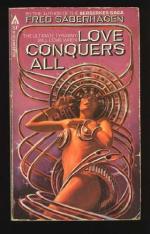Encouraged by this sudden turn of affairs, Immerglueck comes to earth in a boat drawn by four white Holsteins, and, seated alone on a rock, remembers aloud to herself the days when she was a girl. Pilgrims from Augenblick, on their way to worship at the shrine of Schmuerr, hear the sound of reminiscence coming from the rock and stop in their march to sing a hymn of praise for the drying up of the crops. They do not recognize Immerglueck, as she has her hair done differently, and think that she is a beggar girl selling pencils.
In the meantime, Ragel, the papercutter of the gods, has fashioned himself a sword on the forge of Schmalz, and has called the weapon “Assistance-in-Emergency.” Armed with “Assistance-in-Emergency” he comes to earth, determined to slay the Iron Duck and carry off the beautiful Irma.
But Frimsel overhears the plan and has a drink brewed which is given to Ragel in a golden goblet and which, when drunk, makes him forget his past and causes him to believe that he is Schnorr, the God of Fun. While laboring under this spell, Ragel has a funeral pyre built on the summit of a high mountain and, after lighting it, climbs on top of it with a mandolin which he plays until he is consumed.
Immerglueck never marries.
II
IL MINNESTRONE
(PEASANT LOVE)
SCENE: Venice and Old Point Comfort.
TIME: Early 16th Century.
CAST
ALFONSO, Duke of Minnestrone Baritone
PARTOLA, a Peasant Girl Soprano
CLEANSO } { Tenor
TURINO } Young Noblemen of Venice. { Tenor
BOMBO } { Basso
LUDOVICO} Assassins in the service of { Basso
ASTOLFO } Cafeteria Rusticana { Methodist
Townspeople, Cabbies and Sparrows
ARGUMENT
“Il Minnestrone” is an allegory of the two sides of a man’s nature (good and bad), ending at last in an awfully comical mess with everyone dead.
ACT I
A Public Square, Ferrara.—During a peasant festival held to celebrate the sixth consecutive day of rain, Rudolpho, a young nobleman, sees Lilliano, daughter of the village bell-ringer, dancing along throwing artificial roses at herself. He asks of his secretary who the young woman is, and his secretary, in order to confuse Rudolpho and thereby win the hand of his ward, tells him that it is his (Rudolpho’s) own mother, disguised for the festival. Rudolpho is astounded. He orders her arrest.




